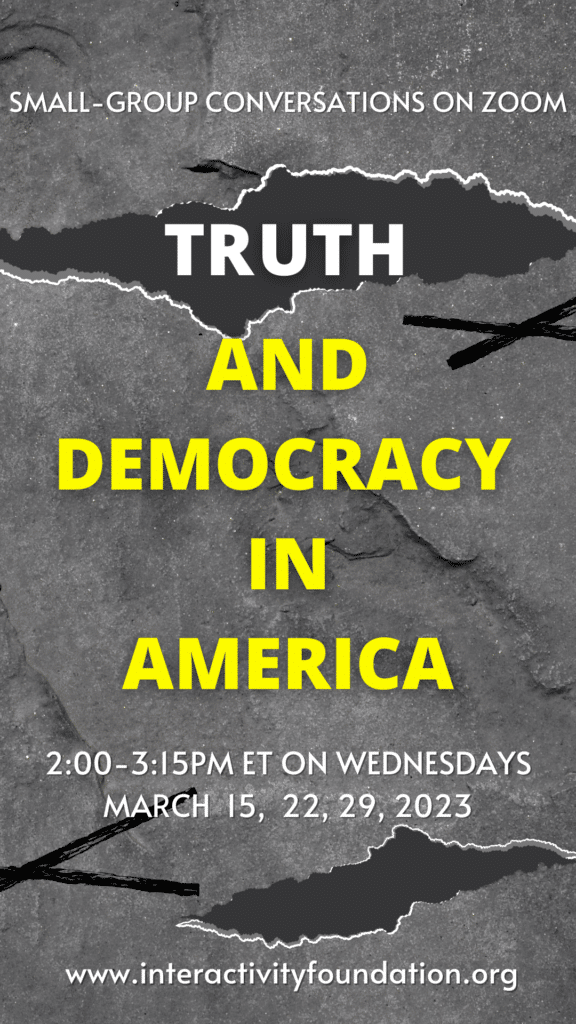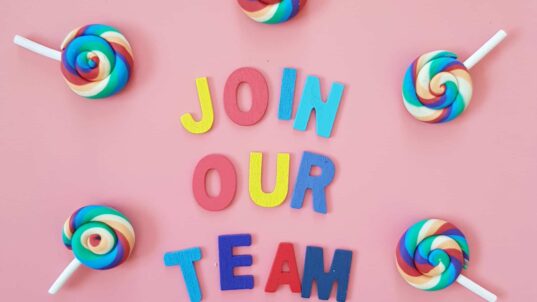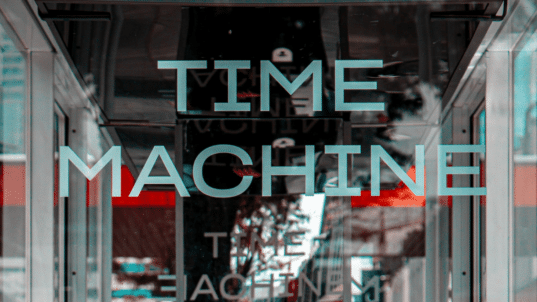
In this third session of our small-group conversation series about Truth & Democracy in America, citizens from around the country gathered online via Zoom for an exploratory discussion of several key questions and concerns about education, truth, and democracy. Below is a summary of the different ideas that emerged from each small-group’s discussion in this third and final session of this 3-part series.
We hope you’ll consider joining us for the next, upcoming discussion series about The Economy & Democracy in America, starting on Wednesday, April 19, 2023, at 2 PM ET. You can learn more about this next discussion series and register for it HERE.
Discussion Summary
What role(s) could or should education play in a democracy? Why does education matter to a democratic society, or what counts as “success” when we think of education in, or for, a democracy?
- It is necessary to help citizens understand what democracy is, how it works, what its boundaries and limits are; what it can and can’t do; and especially that the citizens have a responsibility to participate – and how to do it. “You can’t play the game if you don’t understand the structure, the goals, and the rules.”
- Democracy is an ideal carried in the hearts of its citizens – not a building or singular institution. Education is vital to nurturing certain, essential democratic values, perspectives, truths, and ways of behaving and being.
- Education provides us with other basic democratic skills: how to advocate for ourselves and others; how to respect and abide by law; how to check facts, ask questions, be critical, evaluate, and be skeptical but not cynical.
- Education teaches us how to be with and work with others, how to collaborate, cooperate, and disagree – all vital to democracy. Interactive, “co-created” education is a critical process of “becoming more human,” of empowerment, and a dynamic back-and-forth of both learning about and creating civilization and democracy [citing Freire’s Pedagogy of the Oppressed]
- Education is not just values, we also must have an “informed citizenry,” informed consciousnesses. We, our democracy, need to make good decisions. The “more you know, the better decisions you can make.”
- People in a democracy need to learn critical thinking skills and how to avoid fallacies, like confirmation bias, the sunk cost fallacy, and others.
- Education should be training participants in a democracy to think for themselves, learn how to learn, and to question it all.
- People in a democracy need to not only develop various practical skills, but also learn how to self-advocate, find resources, and gain self-sufficiency.
- Education will be a marker of success if students are making the society better, have work-life balance, and become self-actualized and contributing members of society.
Some initial, key questions about education, truth, and democracy
- What are the “goods” we want from education? We don’t agree on the purpose of education. Is it a “cultural transmission”? Is it developing critical thinking and nurturing curiosity? Is it more about “economic preparation” or skill development for employment? Is it to cultivate “civic skills”?
- How should we learn?
- How should education work in an increasingly multicultural society? How can we meld our pluralism with a desire to have certain shared values and understandings?
- We need to think about lifelong learning and critically reflect on how our assumptions are serving us – “How’s that idea working for you?”
- How do we educate citizens who can think on their own?
- How do you develop the interest in pursuing the truth?
- How do we educate people to be critical thinkers and not just followers?
Some specific challenges & concerns about education, truth, and democracy
- Participants in a democracy need to better understand the differences between a system of governance (democracy) and a system of economics (capitalism or socialism)
- When the family breaks down, we expect the schools to pick up the pieces. So much is expected from schools when families fail.
- The biggest threat to democracy is the monetization of all of our democratic institutions, including the news media, schools, and healthcare.
- We are not investing in democracy: we are not investing in public education, nor teaching critical thinking well. We are even banning books.
- Our schools generate more inequality in our society. We are not teaching about it, and that makes it worse and less understood.
- Concerns about the news media and so much mis/disinformation about schools and education:
- The metastasizing threat of misinformation and disinformation in and about education (the “gaming of democracy,” the “gaslighting” by maligning actors on a large scale).
- A concern that with “self-selected” education curriculum and news, the students are not being exposed to new and challenging ideas; that they are becoming less curious about the world; whereas good education should challenge their thinking and make them more curious; want to learn more.
- The metastasizing threat of misinformation and disinformation in and about education (the “gaming of democracy,” the “gaslighting” by maligning actors on a large scale).
- Certain tropes, like “do your own research,” become self-parodying and often lead to a downward conspiracy cycle as people find and rely on bad information.
- There is a problem of willful ignorance, of accepting facts and not developing critical information skills (to dig deeper, to understand context for facts, and to separate good from bad information).
- A big challenge is educating for critical thinking. Critical thinking in regard to the teaching and learning of history means recognizing that history is dynamic and requires ongoing reinterpretation in light of new evidence and the critical review of all evidence.
- People need to learn to dig deeper, question sources, and look at different perspectives.
- Sources can be wrong, even unintentionally, because they are offering their own interpretation of what happened, which can be limited by their perspectives. It has been shown that eyewitnesses can be unreliable.
- The challenge of enabling free speech, the ability to voice one’s opinions, and the ability to test and question every position that comes up at all stages in the educational process.
- We should be teaching the practice of debate and critical testing of competing ideas or perspectives to all ages.
- If kids are old enough for school, they are old enough to learn to question everything.
- Kids have to be willing even to challenge the teacher.
- Students have to learn to hear the other side and to argue about the truth.
- There is a challenge to encourage the expression of alternative views – which is key for education and democracy.
- Students need to learn to talk to people who are different and have different views, and to learn the skills and dispositions of/towards dialogue.
- There is a concern to better teach critical thinking skills, like not jumping to conclusions too fast, making value judgments, avoiding making everything into binary conflicts, being sensitive to cultural differences.
- So much of success depends on luck – circumstances beyond an individual’s control.
- Need to appreciate how much we learn outside of–and especially after–formal schooling. Indeed, problems, circumstances, and work require that we learn in order to understand the issues and act on them; e.g., look how much we have all learned in just the past few years about public health and government’s power and limits.
- Politicians–with the support of too many voters – “politicizing” the education process: banning books and ideas; limiting what children and all of us can learn.
Some broader categories of concern about education, truth, and democracy
Concerns about the funding for education & the inequality it creates
- “Throwing money at problems won’t solve it.” Look at all the money schools received during the pandemic, and they just wasted it on playground equipment. We need more responsible distribution of funding for things that matter.
- On the contrary, the pandemic shed light on how poorly resourced some schools have been, especially in under-served communities. They used this money to “patch the hole” that our current school funding model created.
- Physical infrastructure, including buildings, playgrounds, and equipment are also important, necessary for healthy learning environments, and often underfunded and maintained.
- Inequitable resources will lead to inequitable communities. Underfunding schools leads to inequality in society. We should be thinking 7 generations ahead instead of being so shortsighted.
- The business model of education is failing us; while choice is good, charter schools are undercutting public schools. “We lose public education, we lose democracy.”
- General disappointment that we have not achieved greater equity in schools; illustrates a failed democratic experiment.
Concerns about technology
- Technology is taking away our ability to talk with each other.
- Rural communities are being left behind without access to broadband.
- AI will upturn how we think about education and the emphasis we place on writing. This will become a big disruptor in how we imagine education and how we teach.
- AI pulls from flawed sources, presenting a distorted version of reality.
Concerns about teachers
- Questions and concerns about whether teachers are qualified and motivated by the right reasons.
- Skepticism about teachers’ ability to teach impartially. How educators have to manage the possible tension of their personal democratic commitments with their roles as educators and, especially with public educators, the possible restrictions on what they can say or do in instructional settings.
- Teachers face great challenges just in managing the classroom and dealing with student behaviors.
- There is a big challenge for educators today – the disconnect between the importance of teaching and the growing disrespect for teachers voiced in the general public.
- In defense of teachers, they are not adequately supported. They are not respected. Their industry is being de-professionalized.
- Schools are falsely defamed.
Concerns about how we teach, the instruction process
- We often suggest that we teach “critical thinking” skills, but we are often not sure that we know how to or can do it well.
- Students are increasingly turned off of politics and civic engagement as the content they receive is “dumbed down” by the political process, and they see politics as something neither connected nor responsive to their own interests and needs.
- Education often focuses too much on specific content/disciplines and too little on the equally or more important social and life-skills that students need to survive and thrive.
- The way we teach should be focused on interrogating our country — not the memorization of facts.
- Concern about restrictions in some states and blatant whitewashing of curriculum. We need to teach history accurately, even if it sheds a bad light on us. (E.g., consider Germany, they teach the history of the Holocaust accurately and don’t feel insulted by hearing the truth, and this has helped them recognize the past wrong and move toward a better society.)
- Concern about “indoctrination.” This is often cited now by one side of the political spectrum, without recognizing that those who complain the most about it are often the ones who try to do it the most. (E.g., there’s often a big emphasis on compelling demonstrations of patriotism in schools, like saying the Pledge of Allegiance.)
Concerns about the administration of schools and school boards
- Those who are governing education do not have the expertise. They tend to be older and do not care as much about the educational systems.
- Voters keep electing people to school boards who should not be elected.
- School boards have become too politicized.
- To be a school board member is a stressful job. (E.g., lots of pressure to figure out how to best use the pandemic resources and stay up-to-date on scientific developments so that we keep children safe and healthy).
What are some possibilities for improving the connections and health of education, truth, and democracy?
- Reshape the education to be more holistic, i.e., to take account of the mind and the body and deal with physical, mental, emotional health.
- Broaden the concept of education beyond K-12 schooling and embrace lifelong learning.
- Reform the education system to help all citizens better discern and respond to questions, such as:
- What is in the common good?
- What do citizens really want/need in order to live together?
- What “shared experiences” do we want us all to have? How can we better “come together”?
- How can we focus on and grow the “humanness” of all citizens?
- How can we come together in dissent and in dialogue?
- Educate voters: citizens need to be better informed since they vote, protest, and engage in other ways.
- Enact higher standards around voting and elections to help escape the “hidden markets of manipulation” that the current power structure imposes. How?
- Strengthen protections against voter manipulation–e.g., keep partisan advocates farther away from the voting process
- Provide better, vetted information for voters
- Have different requirements to be eligible to vote? And, how would we decide on them?
- Practice being citizens by engaging in project-based learning and being culturally respective.
- Consider what is happening internationally – the willingness, the courage of citizens to push back and challenge authority and authoritarianism.
- Regulate and limit campaign contributions so we can have better elections and vote for better people to serve our schools.
- Beware that technology is like fire – it can warm or burn us.
- Value all sorts of education, especially with higher education. Eliminate the stigma for trade schools, community colleges, etc.
- Invest more in education at all levels, so that it is accessible and will break the generational poverty
- Consider multiple and different ways to improve education institutions and their norms:
- Democratize schools; change teaching methods to reflect societal needs
- Deepen the parent-teacher relationship
- Involve parents more to reinforce learning
- Reshape the education process to foster and sustain the inborn curiosity that children have – instead of beating it out of them–and create democratic citizens who are intellectually curious for their whole lives in order to foster lifelong learning
- Embrace alternative learning pedagogy that is narrative based and embraces multiple and competing narratives about history; we have to educate more honestly about our histories to improve how we operate in society.



